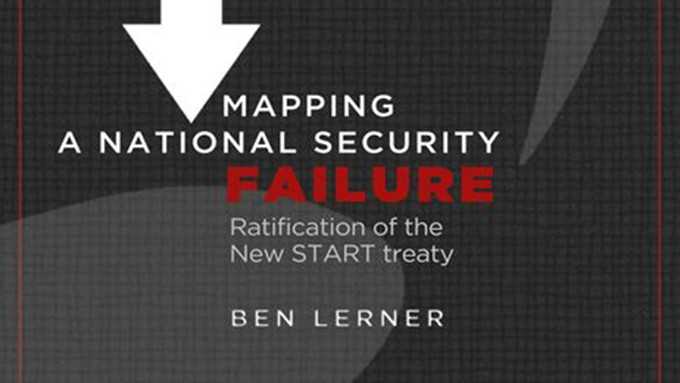Mapping a National Security Failure: Ratification of the New START Treaty

Rose Gottemoeller would later revise the administration’s argument for not sharing the entire negotiating record with the Senate. After insisting that she and her colleagues had already answered “a thousand questions for the record” regarding New START, she later sent a letter to the Senate on 7 December 2010, stating that full disclosure of the negotiating record “would have a chilling effect on future negotiations and overall have a deleterious effect on U.S. diplomacy.”[106]
Both within and outside the context of the negotiating record battle, the Obama administration and its supporters had continued to insist throughout 2010, to the Senate and the American public, that New START did not limit U.S. missile defense capabilities.
Undersecretary of State for Arms Control and International Security, Ellen Tauscher, asserted this on several occasions:
I can definitively tell you that I’m kind of an expert, too. I was chairman of Strategic Forces in the House. I know a little bit about missile defense and was certainly there when most of this was discussed and negotiated. As we’ve talked before, the presidents met in July and they made it very clear that there is an interrelationship between strategic offensive and strategic defensive weapons. But there is no limit or constraint on what the United States can do with its missile defense systems.[107]
The New START Treaty does not constrain U.S. missile defense programs. The United States will continue to improve our missile defenses, as needed, to defend ourselves, our deployed forces, and our allies and partners.… As the administration’s Ballistic Missile Defense Review and our budget plans make clear, we will deploy the most effective missile defenses possible, and the New START Treaty does not impose any additional cost or inconvenience to those efforts.[108]
Undersecretary Tauscher went on to assert similarly before the Senate Armed Services Committee: “The Treaty does not constrain U.S. missile defense programs or long-range conventional strike capabilities.”[109]
In testimony before the Senate Armed Services Committee on 16 June 2010, Lt. Gen. Patrick O’Reilly, director of the Missile Defense Agency, stated:
Throughout the treaty negotiations, I frequently consulted the New START team on all potential impacts to missile defense. The New START Treaty does not constrain our plans to execute the U.S. Missile Defense program.”[110]
Additionally, several former commanders of Strategic Air Command and U.S. Strategic Command sent a joint letter to the Chairmen and Ranking Members of the Senate Armed Services Committee and Senate Foreign Relations Committee on 14 July 2010, which stated in part:
We understand that one major concern about the treaty is whether or not it will affect U.S. missile defense plans…the treaty provides no meaningful constraint on U.S. missile defense plans. The prohibition on placing missile defense interceptors in ICBM or SLBM launchers does not constrain us from planned deployments.[111]
Such claims, however, were seemingly further undermined by revelations suggesting that the Obama administration had in fact presented a draft missile defense agreement to Russia. On 16 June 2010, The Washington Times broke the story that the Obama administration was seeking to conclude a missile defense agreement with Russia in secret, lending some credibility to Dimitri Simes’ hypothesis that the United States had declined to insert into New START any explicit constraints on U.S. missile defense for fear of alienating missile defense proponents in the Senate, opting instead for an implicit arrangement with Russia in this area.[112] This development would be reinforced six months later, when The Washington Times would disclose that an internal State Department memo had made its way to Capitol Hill, in which it was stated that the Obama administration—despite previous denials by Secretaries Clinton and Gates—had held secret talks with Russia for the purpose of attempting to reach a ballistic missile defense agreement.[113]
By the time The Washington Times had broken this news, enough concern had built up around the relationship between New START and missile defense to shape the Senate Foreign Relations Committee’s resolution of ratification. The Committee’s Resolution of Advice and Consent to Ratification, which passed through the Committee on 24 September 2010, included three “understandings” to which, according to the resolution, the advice and consent of the Senate to the ratification of New START was subject.[114] The first of the three understandings—the other two related to rail-mobile ICBMs and so-called “strategic-range, non-nuclear weapons systems”—addressed the Committee’s views on missile defense with respect to New START:
(A) the New START Treaty does not impose any limitations on the deployment of missile defenses other than the requirements of paragraph 3 of Article V of the New START Treaty, which states, ‘Each Party shall not convert and shall not use ICBM launchers and SLBM launchers for placement of missile defense interceptors therein. Each Party further shall not convert and shall not use launchers of missile defense interceptors for placement of ICBMs and SLBMs therein. This provision shall not apply to ICBM launchers that were converted prior to signature of this Treaty for placement of missile defense interceptors therein;’
(B) any additional New START Treaty limitations on the deployment of missile defenses beyond those contained in paragraph 3 of Article V, including any limitations agreed under the auspices of the Bilateral Consultative Commission, would require an amendment to the New START Treaty which may enter into force for the United States only with the advice and consent of the Senate, as set forth in Article II, section 2, clause 2 of the Constitution of the United States; and
(C) the April 7, 2010, unilateral statement by the Russian Federation on missile defense does not impose a legal obligation on the United States.[115]
- Trump’s Election Was a Win in the Fight to Keep Gitmo Open - January 4, 2017
- NDAA and the Counter-Drone Challenge - December 23, 2016
- NDAA Takes On Counter-Drone Challenge - December 8, 2016
